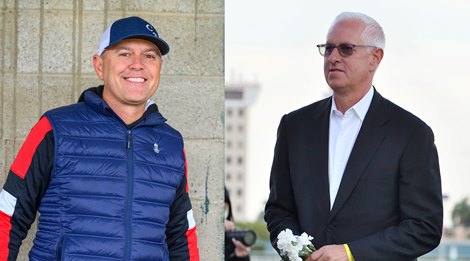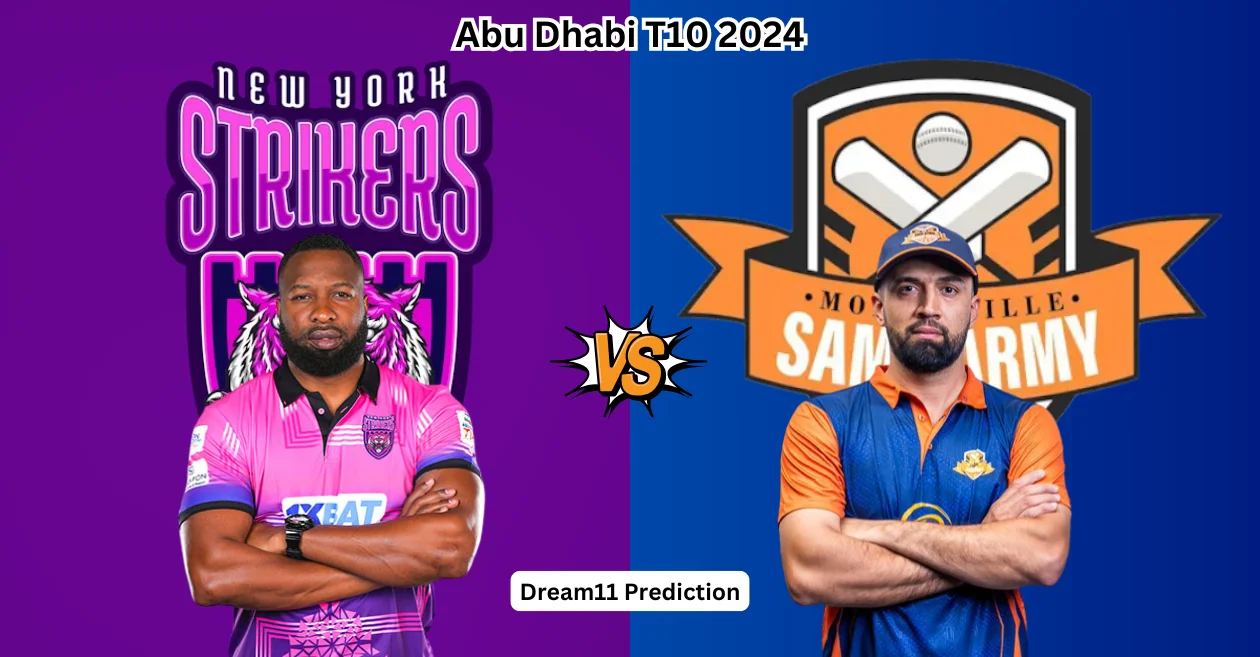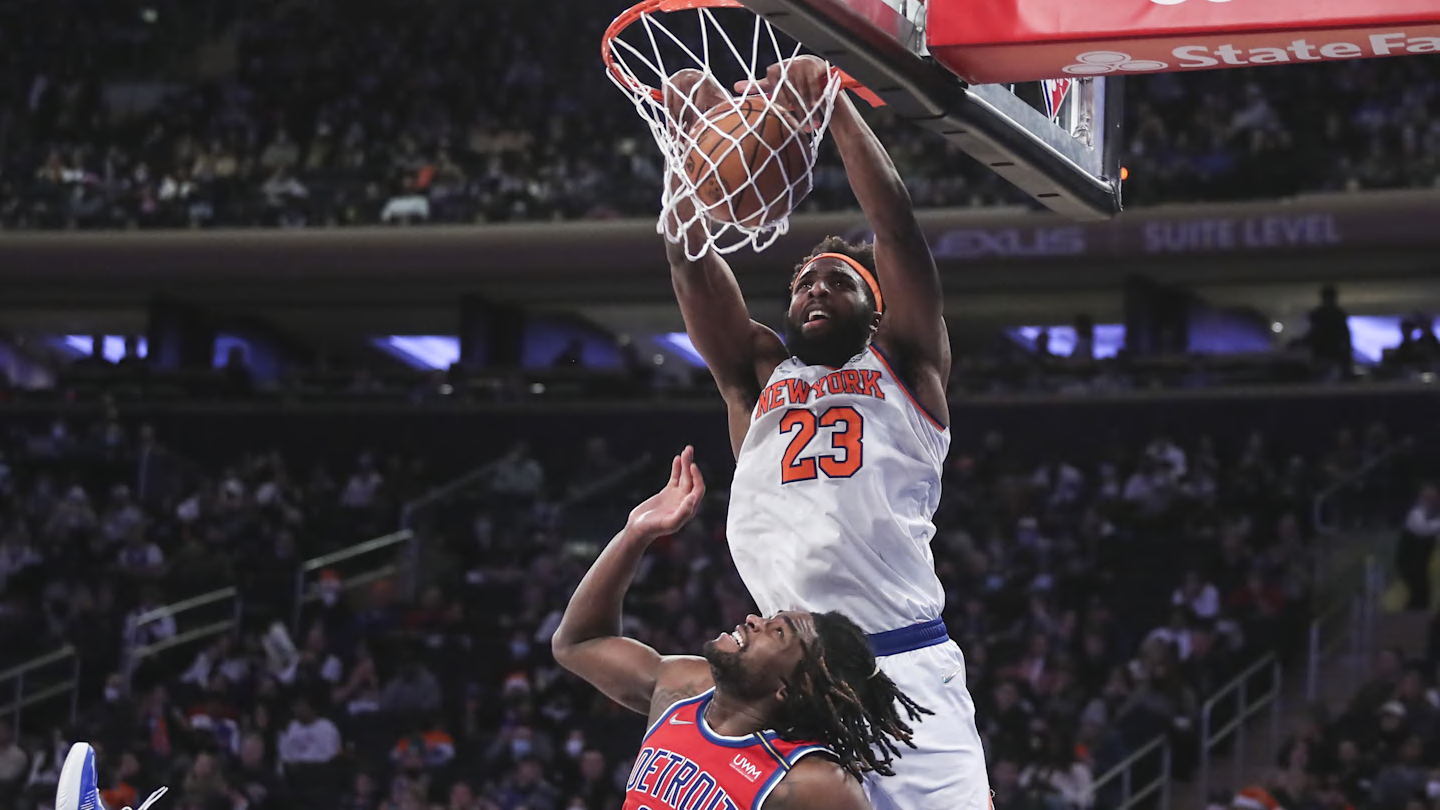It’s been happening for about a decade.
In New York’s major races.
At the Breeders’ Cup.
During the 40 days at Saratoga Race Course.
Now what has been a fixture in New York has taken center stage at the Kentucky Derby (G1).
As much as the May 4 150th edition of the Run for the Roses has been framed as a showdown between the two favorites, Fierceness (5-2) and Sierra Leone (3-1), to a much greater extent it is showcasing the competition between the 3-year-olds’ trainers.
Todd vs. Chad.
Or Chad vs. Todd.
However someone chooses to look at it, for the longest time New York fans have been handicapping races in which the two favorites are trained by Todd Pletcher and Chad Brown.
“One is in the Hall of Fame and the other will be,” said Mike Repole, who owns and bred Fierceness, a son of City of Light trained by 2021 Hall of Famer Pletcher. “Todd and Chad are among the top five trainers in the game right now. They’ve been there for a while and it’s going to continue.”
What rates as racing’s best modern-day rivalry dates back to 2011 when Brown enjoyed his breakout year with 95 wins and $5.2 million in earnings. Pletcher was at the top of the sport’s ladder at the time. He finished the year with his sixth national earnings title, eighth Saratoga training crown, and had five Eclipse Awards to his credit.
Five years later in 2016, the rivalry was joined when Brown received his first Eclipse Award and national earnings title.
Since then, they have been a coupled entry in discussions about the sport’s leading trainers.
“We compete in all areas of the business and we compete in a serious manner,” Brown said.
In their careers they have combined for 12 Eclipse Awards as the outstanding trainer, with Pletcher taking home the prize eight times.
The 56-year-old Pletcher, who started training in 1996, 11 years before Brown’s first starter, has 5,715 wins and holds the all-time record for earnings with $483,496,277 (through May 2). That’s $43 million more than Steve Asmussen in second and $128 million more than Bob Baffert in third.
They have combined for 2,136 stakes wins since 2000, 1,236 in graded stakes.
Sierra Leone at Churchill Downs
The 45-year-old Brown, who trains Sierra Leone, has 2,612 wins and is sixth all-time with $281.3 million in earnings. He is tied for second with 18 Breeders’ Cup wins, two behind the leader, the legendary 88-year-old Hall of Famer D. Wayne Lukas.
Pletcher has 15 Breeders’ Cup victories, two Kentucky Derby wins, four victories and eight seconds in the Belmont Stakes (G1) but is winless in the Preakness Stakes (G1).
Brown owns two Preakness wins but is still seeking initial wins in the Kentucky Derby and Belmont.
“For the last decade we’ve gone toe-to-toe on even terms,” Brown said. “I feel fortunate to be at the same level as Todd and to have this conversation about competing with him.”
Yet the best way to encapsulate the competition between the two is to check the trainer standings at Saratoga. The trainers’ crown at the Spa is arguably the most coveted prize of its kind in the sport and in each year since 2010 Pletcher or Brown has either shared or won the title outright.
They may have different training styles and personalities, but they share a common bond in operating one of North America’s biggest and most successful stables which year after year produces grade 1 winners or champions like Fierceness and Sierra Leone.
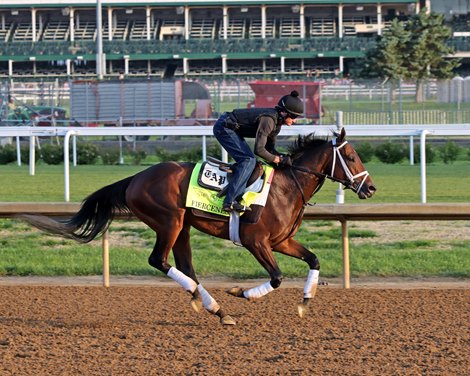
Fierceness on the track at Churchill Downs
“They have very different training styles and they are different people,” said owner Sol Kumin, who has won grade 1 stakes with both trainers. “But they are fiercely competitive and are fiercely competitive with each other. Todd was the guy and then Chad came into the mix and there were swings between who was No. 1. It’s not like Todd was No. 1 and Chad took it from him. There’s been a lot of back and forth. Recently you’ll find (trainer) Brad Cox in the mix but the competition between Chad and Todd has been quite interesting.”
As much as their horses decide matters on the racetrack, the competition between the two trainers extends well beyond the happenings on each day’s card. Pletcher and Brown compete for young horses at sales. They vie for owners and top jockeys.
And it is that cycle of non-stop competition on the same top-shelf New York circuit that makes the interaction between fellow trainers different than the relationships of professional athletes.
“The rivalry is enhanced by running in the same circuit,” Kumin said. “Chad probably doesn’t feel like he’s competing with Bob Baffert, who is in California. But I think he’s competing with Todd all the time for everything. They are always banging heads.”
In general, the constant rigors of competition and the huge amounts of money on the line tend to make friendship among trainers tenuous.
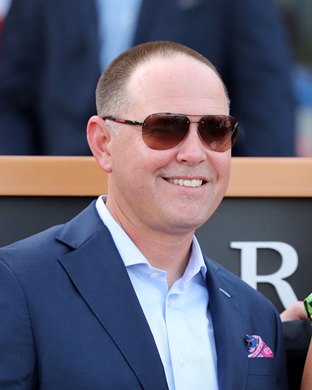
Chad Brown following the Opening Verse Stakes at Churchill Downs
“As it does in any sport these days, friendships among trainers drift away that last week before you go into the arena for a big race. Things started to change among trainers when you began offering $3 million races,” Lukas said. “All the money involved changed things and created tension. Back in the 1980s (trainer Woody Stephens) definitely fueled the fire. He made some derogatory and negative comments about me but you don’t see that these days. Both Chad and Todd are laid back compared to that.”
Pletcher and Brown may not be close friends, but they get along well enough and have mutual respect for the other.
“I think we get along fine. We both appreciate what it takes to compete at this level; the commitment it takes. We don’t go out to dinner, but we’re friendly,” Pletcher said. “It’s a difficult industry to have a lot of friends who are trainers because of the competition. I try to be friendly with everyone but you are not going to have a lot of close friends.”
Brown echoed those feelings.
“I wouldn’t say we’re close but we respect each other and we have a good, professional relationship. I’ve known Todd for more than 20 years,” Brown said. “I’ve found myself surprised at the cordial and professional level of respect we have for each other. I didn’t know things could be like that between competitors, but it makes working in New York around the other big trainer easier.”
For the most part, their conversations involve a quick hello or offering of congratulations on a major win, except when they discuss an important local or national issue in which they can use their combined clout for the common good.
“We’ll stop and talk at the races and sales about industry or things we can agree on to benefit the circuit we’re on and bounce ideas off each other on topics such as surfaces,” Pletcher said.
There is, however, an abundance of respect woven into their relationship.
“Todd is so smart and knows how to be effective with any horse. When I am at the Breeders’ Cup, or at the Triple Crown, I sincerely feel that if I don’t win the race, I am genuinely happy for Todd and his team if they win,” Brown said. “On a national level, I feel my team and his team are on the same team. If I can’t win I would rather see someone from New York win, particularly Todd because we’ve been the most prominent stables in New York the last decade.”
Pletcher voiced praise for the way Brown has been able to keep owners happy even at times when he might start three or four horses in the same stakes.
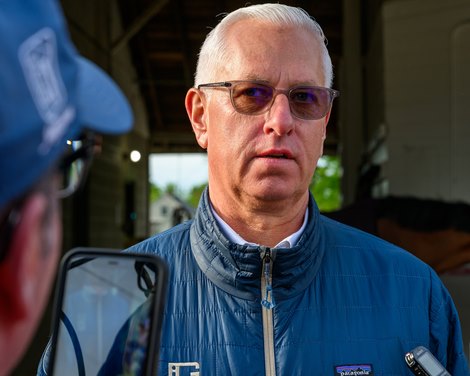
Todd Pletcher
“You have to have your horse ready and prepared because you know Chad will have his horse ready, and he has also done an outstanding job in balancing things,” said Pletcher, a winner of 14 Saratoga training titles. “People say Chad is lucky to have owners like Klaravich Stable and Peter Brant and he is. But that could also be a delicate situation. Those guys are often competing against each other and sometimes you can finish first and second in a race and feel bad about it. It’s not as easy of a situation as it may seem to keep everyone happy.”
As successful as both are, the two have completely different personalities. Pletcher is reserved and measured. Brown is far more emotional and talkative.
“In terms of personalities, Chad is more up and down and more emotional. Todd is the opposite. He is steady and doesn’t get emotional,” Kumin said. “If Chad likes a horse before it debuts, he’ll say, ‘I’ll meet you in the winner’s circle.’ He is animated, confident, and excited and he’ll show it. Todd will say, ‘I think this one can run a bit.’ That’s the way they are. They have different demeanors and personalities. It’s really polar opposites.”
Those differences can sometimes play as big of a role in landing a new client as their win percentage.
“As an owner, you can find the trainer your personality clicks with. The four or five trainers I use have different personalities, so you can pick who you want in your corner,” Kumin said. “Being calm is nice but so is being emotional and knowing someone is in your corner and really cares.”
In theory, owners would seem likely to gravitate toward a trainer who matches their own personality, but that’s not always the case.
Just look at Pletcher and Brown’s top owners. Both are billionaires. Pletcher has Repole, who rates as the sport’s most outspoken and talkative owner. Brown has Seth Klarman of Klaravich Stable, a part owner of the Boston Red Sox who shuns publicity.
One would think Brown would be a better fit for Repole and Pletcher for Klarman, but in this instance, opposites attracted and merged together in a highly successful manner.
“Chad and I are friendly and we talk a lot and agree a lot about what should be done in racing but if Chad was my trainer, I think he might fire me before I fire him. If Klarman was with Todd you might not even know they have horses with each other,” Repole said. “For Seth it’s a great balance that he’s the way he is and Chad is the way he is. For Todd, at the end of the day, if he stops training I would leave the game. He’s gone from trainer to partner to friend to family. There’s a loyalty there.
“Different styles are true in any business. In my management teams, if I just want to hire people like me, it would be cheaper to buy 10 mirrors.”
Brown said owners in search for someone to train their horses should not rely solely on snapshots of a person.
“You can’t judge things on one clip or one freeze frame. You have to get to know someone. People would be pretty surprised to find out what Todd and I are like when they hang out with us,” Brown said. “They might say ‘I didn’t think Todd was that funny or I didn’t know that he gets upset or says a swear word.’ Same thing with me, they might come away saying. ‘I didn’t realize that Chad thought much about this or that, or that he can be a funny guy and pretty reserved and organized in his thinking and dealings.’ They might understand why I get along with a guy like Seth.”
When Brown was rising to prominence in the industry, it was easier to decide whether to use him or Pletcher.
About 10 years ago, if an owner wanted a good 2-year-old on dirt or a Triple Crown candidate or a $1 million yearling, they needed to talk to Pletcher. If they wanted a good turf horse, especially a filly, Brown was their man.
Now that has all changed with both excelling on any surface and distance.
“Chad gets more opportunities on the turf than Todd does and Todd gets more opportunities on the dirt than Chad does. Some people still think that way but I believe they have both proven that they are great horsemen who can train any kind of horse. They can both train horses that go short and long which is more unique than the turf/dirt angle,” Kumin said. “They also believe they are under-represented on the other side with dirt and turf horses.”
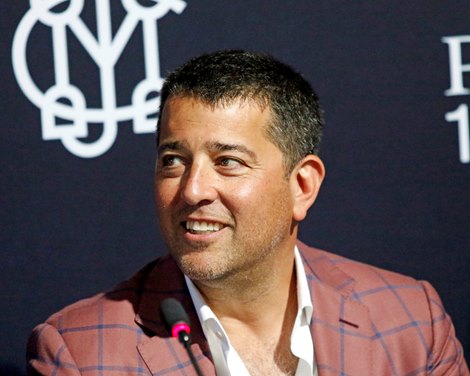
Owner Sol Kumin has had horses with Chad Brown and Todd Pletcher
Pletcher trained last year’s champion male turfer Up to the Mark for Repole and St. Elias Stables, and he won the Pegasus World Cup Turf Invitational Stakes (G1T) with Colonel Liam in 2021 and 2022.
“I think you get labeled or mislabeled as someone who can only train one type of horse and I think you look at Chad’s overall record it’s good on dirt and turf and it’s the same for us. We had the champion turf horse last year,” Pletcher said. “Our program does not go out and look for turf horses. Up to the Mark is a good example of that. He was an expensive yearling, a beautiful yearling that ultimately did not perform as well on the dirt as we thought he would. But he turned out to be a champion on turf. That’s sort of how we wind up with them as opposed to going to the European sales and buying turf pedigrees. We try to get the most out of what we have and if a horse likes turf we want to optimize their potential.”
On dirt, Brown has won the prestigious Champagne Stakes (G1) for 2-year-olds four times and trained 2017 2-year-old male champ Good Magic , the sire of 2023 Kentucky Derby winner Mage . He has a pair of Preakness winners, has produced several promising stallions in recent years, and when given a $2.3 million yearling purchase in Sierra Leone, he turned him into a grade 1 winner and the second choice in the Kentucky Derby.
Not bad for a “turf” trainer.
“It’s still a little frustrating that I am not getting a fair look by stables who race dirt horses trying to make stallions, because when you look up Good Magic is doing well as a stallion,” Brown said. “Practical Joke is doing well. I have Jack Christopher on the way and Early Voting and Complexity are stallions. The Champagne is a dirt stallion-making race and I’ve won it four times.”
For Brown, who will also send out longshot Domestic Product (30-1) in the Run for the Roses, a Kentucky Derby victory would surely put an end to anyone calling him a “turf trainer.”
But to claim that monumental victory, foremost among the 19 horses to beat is Fierceness and Todd Pletcher.
It’s Todd vs. Chad.
Not at Saratoga but Churchill Downs | BloodHorse.com Track Profile”>Churchill Downs on the first Saturday in May.
Who says rivalries are a thing of the past in horse racing?

